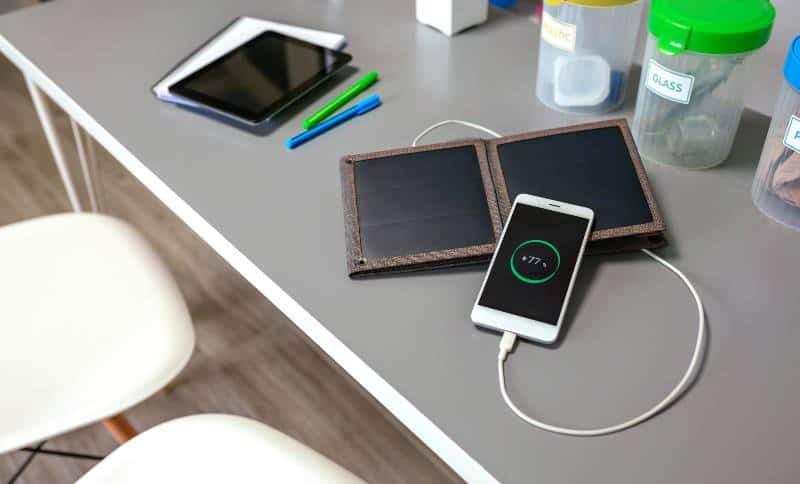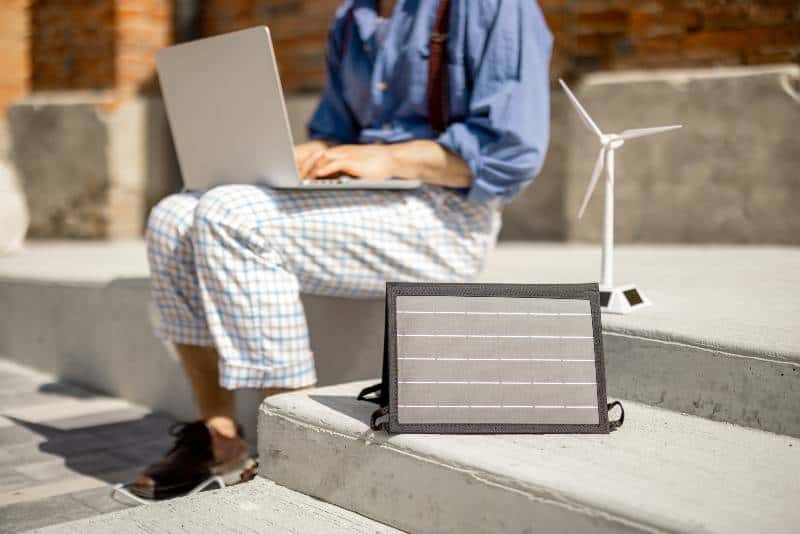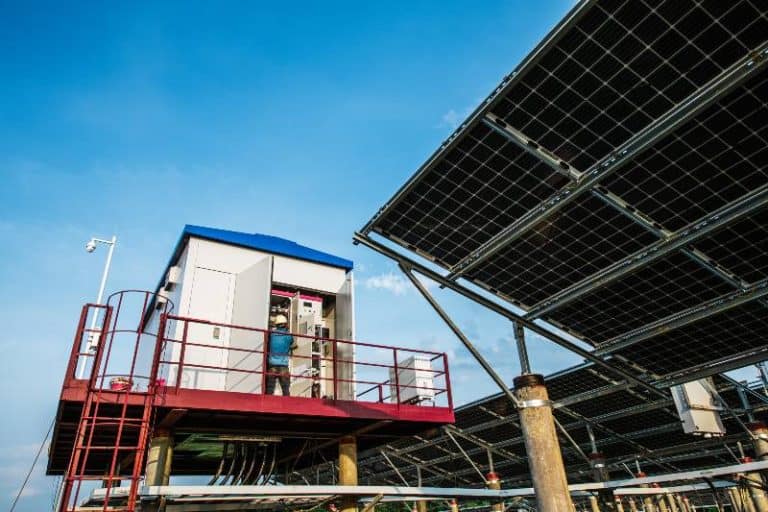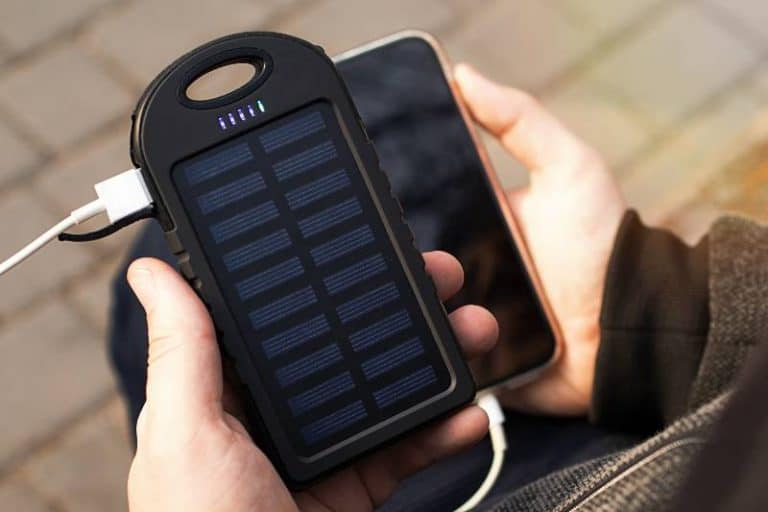Solar Power On-the-Go: Portable Solar Panels for Work
Let’s face it: whether you work from home, in an office, or on the road — energy cost savings and environmental responsibility are on everyone’s mind. If you’re looking for a sustainable way to power your mobile workspace, portable solar panels might just be the solution! Portable solar panels offer efficient and eco-friendly energy, all while reducing your operational costs. As companies become more conscious of their environmental impact, moving to solar is increasingly becoming part of doing business in today’s economy. Read on to learn more about how easy it can be to set up a portable solar panel system that will provide consistent and reliable power at an affordable rate for your business needs!
As summer approaches, there is concerning news regarding certain areas of the U.S. power grid. According to a recent grid reliability report, regions in the Midwest, California, and Texas are facing high risks of outages due to insufficient power supply, especially as temperatures begin to rise. In light of this situation, it becomes increasingly crucial to consider the use of portable solar panels for work, as they can provide a reliable alternative source of power in times of need.
Key takeaways
- Portable solar panels offer numerous benefits for work environments, including energy independence, cost savings, environmental sustainability, and convenience. They provide a reliable and renewable power source for electronic devices, tools, and charging batteries, making them ideal for remote locations or outdoor work.
- When choosing portable solar panels for work, it’s important to consider factors such as power requirements, size, weight, durability, and additional features.
- Investing in portable solar panels for work is not only a smart financial decision but also a contribution to a greener and more sustainable future.

\What Are Portable Solar Panels?
Portable solar panels, as the name implies, are mobile and easy-to-carry solar panel systems that convert sunlight into electricity. Unlike traditional fixed solar panels, these portable variants are designed for on-the-go energy needs and are popular with travelers, campers, RV owners, and even those in emergency situations where a power source is not readily available.
These panels work on the same basic principle as their stationary counterparts: they leverage photovoltaic cells to convert sunlight into electrical power. The sun’s rays consist of photons, which, when they strike the photovoltaic cells, cause electrons to move, thereby generating an electric current. This electricity can then be used immediately to power devices or stored in a battery for later use. Portable solar panels typically come with all necessary components, including charge controllers to regulate the amount of electricity sent to the battery, and various plugs and connectors to accommodate different devices.
Types of Portable Solar Panels Available in the Market
There are several types of portable solar panels available in the market, each with its own advantages and specifications:
- Monocrystalline Portable Solar Panels: These panels are known for their high efficiency and durability. They’re made from a single, pure silicon crystal structure, which results in a higher yield of electricity.
- Polycrystalline Portable Solar Panels: These are manufactured using multiple silicon crystals. While slightly less efficient than monocrystalline panels, they’re generally more affordable and still offer a reliable source of energy.
- Thin-Film Portable Solar Panels: As the lightest and most flexible option, these panels are ideal for backpacking or scenarios where weight and space are significant factors. However, they tend to be less efficient compared to other types.
- Foldable or Rollable Solar Panels: These are highly portable solar panels designed for easy transportation. They can be folded or rolled up when not in use, taking up minimal space.
Key Features and Specifications to Consider When Purchasing
Before purchasing a portable solar panel, consider the following features and specifications:
- Power Output: Look for a panel that produces the amount of power you need. This is measured in watts (W). For example, if you want to charge a 10W device, you’ll need a panel that can generate at least that amount under optimal sunlight conditions.
- Size and Weight: Your panel should be lightweight and compact enough for your mobility needs. Foldable and rollable solar panels offer great portability, but make sure to compare their power output to your requirements.
- Efficiency: This indicates how well the panel converts sunlight into electricity. Monocrystalline panels are typically the most efficient, but other types may suffice depending on your needs.
- Durability: Consider how well the panel stands up to outdoor elements, such as rain, wind, and dust. Look for panels made with robust materials and ones that are weatherproof or waterproof.
- Compatibility: Ensure the panel has the correct connectors and adapters to power your devices. Some panels come with a built-in USB port or other connections, which can be very convenient.
- Battery/Power Bank: Some portable solar panels come with a built-in battery, which allows you to store power for later use. This can be particularly useful if you’ll be using the panel in an area with limited sunlight.
Remember, the best portable solar panel for you will depend on your specific energy needs, budget, and how and where you plan to use it. Do your research and compare various models to ensure you make the most informed choice.
Benefits of Portable Solar Panels for Work
Energy independence and cost savings
Portable solar panels offer an excellent source of clean, renewable energy that can be harnessed wherever sunlight is available. This gives users a great degree of energy independence. Instead of relying on the grid, which can be vulnerable to blackouts and price fluctuations, users can generate their own power directly from the sun.
For example, imagine a construction site in a remote location where access to the grid might be challenging. By buying portable solar panels, the team can power their tools, lights, and equipment, saving on the costs of diesel generators or extensive cable setups. A solar generator is indeed a lifesaver. Over time, these savings can add up significantly, reducing the overall cost of operations and contributing to the profitability of projects. Moreover, as these solar panels are reusable across multiple projects, their value proposition increases over time.
Environmental impact and sustainability
Utilizing portable solar panels is an excellent way to minimize the environmental footprint of your work. Solar energy is a renewable resource, which means that, unlike fossil fuels, it doesn’t deplete the earth’s resources or contribute to climate change.
For example, a food truck powered by solar panels instead of a gas generator would emit significantly less carbon dioxide, a key contributor to global warming. By choosing solar energy, businesses can demonstrate their commitment to sustainability, which can enhance their brand reputation among environmentally-conscious consumers and partners. Additionally, many governments and organizations provide incentives for adopting renewable energy, making solar panels an even more attractive option.
Flexibility and convenience
One of the greatest advantages of portable solar panels is their flexibility. Because they’re not fixed in place like conventional solar arrays, they can be easily moved to wherever they’re needed, making them an ideal power solution for a variety of scenarios.
For instance, a film crew working in multiple outdoor locations could use portable solar panels to power their equipment without having to worry about finding a local power source or transporting heavy solar generators. This can significantly streamline operations and make planning and logistics simpler and more efficient. Portable solar panels are also available in a range of sizes and capacities, so they can be tailored to the specific needs of each use case.
Emergency power backup
In the event of power failures or blackouts, having a portable solar panel can prove extremely useful. As long as there is sunlight, these devices can continue to provide electricity, acting as a reliable emergency power backup. Consider a situation where a storm has caused power outages across a city, but a medical clinic has portable solar panels.
They could use these panels to power essential medical equipment like refrigeration for medications, keep the lights on, and ensure that their services remain operational. This reliability can be lifesaving in critical scenarios and provide peace of mind in less dire circumstances. It’s an added layer of security that can make a significant difference when traditional power sources fail.
Applications in the Workplace
Powering electronic devices and tools
Portable solar panels can effectively power a variety of electronic devices and tools in the workplace, especially in industries that rely on outdoor or remote operations. This can range from small devices like laptops, smartphones, or handheld equipment to larger tools like drills, saws, or lighting equipment.
For instance, a team of archaeologists working at an excavation site in a remote area could use portable solar panels to power their electronic surveying equipment, cameras, and laptops. This ensures the team can carry out their data collection, research, and communication tasks smoothly, without needing to depend on unreliable or non-existent grid power.
Charging batteries and power banks
In the workplace, maintaining a consistent power source is crucial for the seamless functioning of many devices. Portable solar panels are excellent for charging batteries and power banks that can then be used to power other equipment, even when the sun isn’t shining. For instance, a delivery service company could equip their vans with portable solar panels, allowing batteries to be charged throughout the day. These stored power reserves can then be used to power GPS devices, handheld devices for package scanning, or even maintain the charge of electric vehicles, ensuring operations can continue efficiently around the clock.
Providing electricity in remote locations
Workplaces are not always confined to urban areas with easy access to electricity. For jobs that require work in remote locations, like wildlife researchers, geological survey teams, or outdoor event organizers, portable solar panels are a lifesaver.
They can generate the necessary electricity for lighting, communication devices, scientific instruments, sound systems, or even food preparation equipment. For example, a team of geologists working in a distant field site can use portable solar panels to power their seismographs and other equipment, allowing them to conduct their research without worrying about access to electricity.
Enhancing outdoor work efficiency
Outdoor work environments often lack easy access to grid electricity, which can hamper efficiency. Whether it’s a construction site, a film shooting location, or an agricultural field, portable solar panels can provide a reliable and convenient source of power. This, in turn, can significantly enhance work efficiency. For instance, a film crew shooting in various outdoor locations can use portable solar panels to power cameras, sound equipment, and lights. This not only reduces the logistical challenge of transporting and setting up power generators but also reduces the time spent on arranging power supply, leading to increased productivity and efficiency.
Choosing the Right Portable Solar Panel
Determining power requirements
Before investing in a portable solar panel, it’s crucial to understand your power requirements. This means identifying the types and quantities of devices or tools you plan to power, and how long you’ll typically need to use them each day.
For instance, a small digital device like a smartphone or tablet might only require a panel with a modest output, whereas more power-hungry equipment like a power drill or a lighting system might require a larger panel or multiple panels. By calculating your daily energy needs, you can determine the panel size (in watts) that will best meet your requirements. It’s also wise to consider future needs in case you expand your operations or add more equipment, as this can prevent you from needing to upgrade your solar system prematurely.
Evaluating size, weight, and portability
Given that one of the key benefits of portable solar panels is their mobility, it’s essential to consider the size, weight, and portability of the panel. The right choice would depend on your specific use case. For example, if you are a hiker needing to charge handheld GPS devices or cameras, you would require a small, lightweight solar panel that can easily fit in your backpack.
On the other hand, a construction site might necessitate larger, more robust panels that, while heavier, can generate more power to operate heavier machinery. Some portable solar panels are foldable or come with easy-carry features like handles or carrying cases, making transport easier.
Assessing durability and weather resistance
The conditions in which you’ll be using your portable solar panel will significantly impact your choice. Panels will be exposed to the elements, so it’s essential to choose a model that is durable and can withstand various weather conditions.
For example, a marine biologist using a solar panel on a boat would need a panel that is not only waterproof but also resistant to the corrosive effects of saltwater. Similarly, if the panel is to be used in a desert environment, it should be capable of withstanding high temperatures and dusty conditions. A well-built, durable panel might cost more upfront, but it could save money in the long term by outlasting cheaper, less resilient models.
Considering additional features and accessories
When selecting a portable solar panel, also consider the additional features and accessories that might enhance the panel’s functionality or ease of use. For instance, some panels come with built-in USB ports or power outlets, making it easier to connect devices. Others might come with integrated battery storage, allowing for energy storage during the day and use at night. There are also models with adjustable stands or mounting options to optimize the panel’s orientation toward the sun.
An outdoor event management company, for instance, might find a solar panel with integrated battery storage particularly useful for powering lights or sound systems during evening events. Therefore, while the basic function of a solar panel is to convert sunlight into electricity, these additional features can sometimes make a significant difference in user experience and operational efficiency.
Tips for Using Portable Solar Panels at Work
Maximizing sunlight exposure and optimizing performance
To optimize the performance of portable solar panels at work, it’s critical to maximize their exposure to sunlight. The panels should ideally be placed in an open area with direct sunlight and minimal shade. Position them so they are facing the sun directly, and adjust their position throughout the day as the sun moves across the sky. The angle of the panels can also impact their performance.
As a general rule, the panel’s angle should approximately equal the latitude of the location. For example, if you’re working at a construction site in New York City (which is roughly 40 degrees latitude), your panel should be angled about 40 degrees from the horizontal. Ensuring optimal positioning will allow the panels to absorb the maximum amount of solar energy, thereby increasing the overall efficiency of power generation.
Ensuring proper maintenance and storage
Maintaining your portable solar panels in good working condition is crucial to their longevity and performance. Cleaning the panels regularly is important as dust, dirt, or bird droppings can block sunlight and reduce the panels’ effectiveness. Use a soft cloth or sponge with warm, soapy water to clean the surface, and avoid using any harsh chemicals or abrasive materials that could damage the panels.
After use, the panels should be dried and stored in a dry, cool place out of direct sunlight. Furthermore, when not in use, the panels should be disconnected from any devices or batteries to prevent unnecessary power drain. Regularly inspect your panels for any signs of damage or wear and tear, and consult with a professional if repairs are needed.
Addressing common challenges and troubleshooting
Using portable solar panels at work can come with a few challenges, but being prepared can help you troubleshoot issues effectively. One common challenge is insufficient power generation, which could be due to improper positioning, insufficient sunlight, or a problem with the panel itself. Regular monitoring of your solar panel’s performance can help you detect and resolve any issues promptly.
For example, if you notice a significant drop in power output, it could be due to a shadow falling on the panel, dirt or debris covering the surface, or a malfunctioning component. In case of technical issues, it’s often best to refer to the manufacturer’s instructions or contact their support service for guidance.
Additionally, be aware of the weather conditions. Portable solar panels are typically designed to be weather resistant, but extreme weather like heavy rain, hail, or high winds could potentially damage them. If you expect severe weather, it might be best to dismount the panels and store them safely until conditions improve.
Lastly, remember that not all devices can be powered directly from a solar panel. Some sensitive devices may require a stable power supply, which can be achieved through a battery or a charge controller. Always check the power requirements of your devices before connecting them to a solar panel.
Popular Portable Solar Panel Brands and Models
When it comes to choosing portable solar panels, there are several leading brands that are known for their quality, reliability, and innovative features.
- Goal Zero: Renowned for their range of solar panels and power stations, Goal Zero products are known for their durability, efficiency, and ease of use. They offer a range of portable solar panels from small, compact models for personal use to larger, more powerful units for industrial applications.
- Renogy: Renogy offers a wide array of portable solar panels with various power outputs, accommodating diverse energy needs. Their products are recognized for their robust build quality, high energy efficiency, and comprehensive user manuals, making them a popular choice for both novice and experienced users.
- Jackery: Jackery specializes in outdoor green power solutions. They are known for their innovative design, user-friendly features, and excellent customer service. Their portable panel is often paired with their power stations for a complete portable power solution.
- Anker: Known primarily for its digital accessories, Anker also provides a selection of portable solar panels. Their panels are appreciated for their lightweight design, compact size, and integrated USB ports, making them ideal for charging small devices on the go.
HI wanted to share with you this exciting article that I recently wrote. It’s all about the 39 smart and innovative ways you can utilize portable solar panels. These versatile and eco-friendly devices offer a wide range of possibilities, from powering your camping adventures to charging your electronic devices on the go. So if you’re looking for practical and sustainable energy solutions, be sure to give this article a read!
Highlighting recommended portable solar panel models
Based on the overall product quality, user reviews, and unique features, here are some recommended portable solar panel models from these popular brands.
- Goal Zero Nomad 50: This is a lightweight, foldable solar panel that offers 50W output. It’s built with strong, durable materials and comes with an integrated kickstand that lets you angle the panel toward the sun for maximum efficiency. This model is ideal for charging power stations, smartphones, tablets, and other small to medium devices.
- Renogy 100 Watt Eclipse Monocrystalline Solar Suitcase: This is a highly efficient, portable solar panel that comes with an adjustable aluminum stand, handle, and protective casing for easy transport and use. The 100W output makes it suitable for charging larger batteries or powering more substantial devices.
- Jackery SolarSaga 100W: This portable solar panel is designed for outdoor usage and perfectly pairs with Jackery’s portable power stations. It has two USB outputs and one DC output, and it’s made with durable, weather-resistant materials. The built-in kickstand allows you to position it at the optimal angle for sunlight exposure.
- Anker 21W PowerPort Solar Charger: This compact and lightweight solar charger is ideal for backpackers or workers on the go. It features dual USB ports and utilizes Anker’s PowerIQ technology to deliver the fastest possible charge to connected devices. Although it has a lower power output than some other models, it is still a reliable option for charging smaller devices like smartphones or tablets.
When choosing a portable solar panel, remember to consider your specific needs, including power requirements, portability, and durability, and always check user reviews and product specifications for a comprehensive understanding of the product’s performance.
Cost Considerations and Return on Investment
Initial investment and long-term cost savings
While the upfront cost of portable solar panels can be significant, it’s crucial to consider the long-term cost savings they can provide. Unlike conventional power sources that have ongoing costs associated with fuel or electricity rates, the ‘fuel’ for solar panels, i.e., sunlight, is completely free.
After the initial investment, the only costs you might incur are for maintenance and potential replacement of parts, which are generally low.
The cost savings can be substantial, especially for businesses that operate in remote areas where the costs of setting up and maintaining a conventional power source can be high. For example, instead of continually renting or buying fuel for generators at a construction site, a one-time investment in portable solar panels can provide a free, renewable source of power for years to come.
The savings can be even more significant if you take into account the possible tax credits or incentives for using renewable energy that are available in some regions.
Factors influencing the pricing of portable solar panels
Several factors can influence the pricing of portable solar panels. Firstly, the power output of the panel is a major factor. Panels with higher wattage, capable of generating more electricity, tend to be more expensive. Secondly, the materials used in the construction of the panels can also impact the price.
Panels built with high-quality, durable materials designed to withstand various weather conditions are likely to cost more.
Additional features can also contribute to the cost. Panels that come with built-in battery storage, USB ports, adjustable stands, or advanced solar cells like monocrystalline or thin-film technology may have a higher price tag. Lastly, brand reputation can also influence pricing. Well-established brands with a track record of high-quality products and good customer service may charge more for their products compared to lesser-known brands.
Calculating the payback period and return on investment
The payback period of a portable solar panel refers to the amount of time it takes for the cost savings from using the panel to equal the initial investment. Calculating the payback period can help you understand when you will start to see a return on your investment.
To calculate this, you first need to estimate how much you would typically spend on conventional power sources for the same amount of energy the panel provides. This could include costs like fuel for generators, electricity bills, or even rental fees for accessing grid power in remote locations.
Next, divide the cost of the solar panel by these monthly savings. The result will give you a payback period of months.
For example, if a portable solar panel costs $400 and saves you $50 per month on fuel and electricity costs, the payback period would be $400 / $50 = 8 months. After 8 months, you would begin to ‘profit’ from your investment in the form of cost savings.
While this is a simplistic example and actual calculations might need to take into account other factors like maintenance costs and potential energy production variations, it gives a basic understanding of how to approach the return on investment for a portable solar panel.

Portable Solar Panels for Work FAQs
How long does it take to charge devices using portable solar panels?
A phone with 5% battery life can be fully charged by a fully charged portable solar panel in approximately two to three hours. This is only an estimate.
Can portable solar panels be used as a primary power source in remote locations?
Yes, Portable solar charging stations are often built to withstand harsh weather conditions and are a reliable power source even in remote areas.
Are portable solar panels easy to transport and set up?
Portable solar panels are downsized and more movable compared to the typical solar panels like rooftop solar panels in solar farms. They are created to be conveniently transported and installed, making them ideal for activities such as camping, living in RVs, or using them as reserve power supplies in unexpected situations.
What should I consider when choosing the right portable solar panel for my work needs?
When selecting a portable solar panel, consider your specific needs such as the power requirements for your devices, portability requirements, and the durability of the product. You should also look into user reviews and product specifications to get a better understanding of how the product performs in different conditions.
How much do portable solar panels cost?
The cost of portable solar panels varies depending on factors such as power output, materials used, additional features, and brand reputation. Generally speaking, higher-wattage models with advanced features will be more expensive than their simpler counterparts.
Conclusion
Portable solar panels are an excellent way to access energy without being tied to a grid. These devices generate clean electricity, cost minimal upfront money for set up, and can save a business a lot of money in the long run. With portable solar panels, you can enjoy the convenience of never having to worry about recharging batteries or powering electronic tools. Plus, this technology helps to preserve the planet by cutting down on emissions from traditional fuel sources.
In sum, they provide impressive performance at a great value. Plus, with Electik Living, you can have access to informed tips and advice to enhance your experience with portable solar panels—all while maintaining environmental sustainability. Sign up today and start crafting customized green solutions for your business’ needs!






